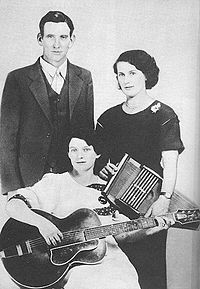The Carter Family | |
|---|---|
 A. P., Maybelle, and Sara Carter (L–R) in 1927 | |
| Background information | |
| Origin | Maces Spring, Virginia |
| Genres | |
| Years active |
|
| Labels | |
| Members | |
| Past members |
|
The Carter Family was a traditional American folk music group that recorded between 1927 and 1956. Their music had a profound influence on bluegrass, country, Southern Gospel, pop and rock music, as well as on the U.S. folk revival of the 1960s.
They were the first vocal group to become country music stars, and were among the first groups to record commercially produced country music. Their first recordings were made in Bristol, Tennessee, for the Victor Talking Machine Company under producer Ralph Peer on August 1, 1927. This was the day before country singer Jimmie Rodgers made his initial recordings for Victor under Peer.
The success of the Carter Family's recordings of songs such as "Wabash Cannonball", "Can the Circle Be Unbroken", "Wildwood Flower", "Keep on the Sunny Side", and "I'm Thinking Tonight of My Blue Eyes" made these songs country standards. The melody of the last was used for Roy Acuff's "The Great Speckled Bird", Hank Thompson's "The Wild Side of Life" and Kitty Wells' "It Wasn't God Who Made Honky Tonk Angels". The song became a hit all over again in these other incarnations.[1]
The original group consisted of Sara Carter, her husband A. P. Carter, and her sister-in-law Maybelle Carter. Maybelle was Sara's first cousin, and was married to A.P.'s brother Ezra Carter (Eck). All three were born and raised in southwest Virginia. They were immersed in the tight harmonies of mountain gospel music and shape note singing. The latter dated to the early 19th century and revivals in the South.
Throughout the group's career, Sara Carter sang lead vocals and played rhythm guitar or autoharp. Maybelle sang harmony and played lead guitar. On some songs A.P. did not perform at all; on some songs he sang harmony and background vocals, and occasionally he sang lead. Maybelle's distinctive guitar-playing style became a hallmark of the group. Her Carter Scratch (a method for playing both lead and rhythm on the guitar) has become one of the most copied styles of guitar playing.
The group (in all its incarnations, see below) recorded for a number of labels, including RCA Victor (and subsidiary label, Bluebird), ARC group, Columbia, Okeh and various imprint labels.[2][3][4]
- ^ Heatley, Michael (2007). The Definitive Illustrated Encyclopedia of Rock. London: Star Fire. ISBN 978-1-84451-996-5.
- ^ Zwonitzer, M. & Hirshberg, C. (2002). Will You Miss Me When I'm Gone? The Carter Family & Their Legacy in American Music. New York: Simon & Schuster.
- ^ ["The Carter Sisters & Mother Maybelle: Living Tradition", in The Journal of the Academy for the Preservation of Old-Time Country Music]
- ^ Sunny Side Sentinel: Official Publication for the Carter Family, Discography Issue (1980)